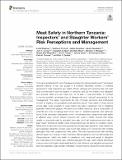Meat safety in northern Tanzania : inspectors' and slaughter workers' risk perceptions and management
Abstract
Through a social scientific lens, this paper considers the risk perceptions and “risk-based decision-making” of two key groups in a northern Tanzanian context: (1) frontline government meat inspectors and health officers charged with ensuring that red meat sold commercially is safe for people to consume, and (2) the workers who slaughter and process cattle and red meat prior to its sale in rural butcheries. In contrast to techno-scientific understandings of disease risk and “rational” approaches to its management, this paper foregrounds the role of social, economic and institutional context in shaping the perceptions and practices around meat safety of these actors whose daily, close proximity to meat means they play a significant role in mitigating potential meat-borne disease. We show how limited resources, and a combination of scientific and local knowledge and norms result in “situated expertise” and particular forms of risk perception and practice which both enhance and compromise meat safety in different ways. Actors' shared concerns with what is visible, ensures that visibly unsafe or abnormal meat is excluded from sale, and that infrastructure and meat is kept “clean” and free of certain visible contaminants such as soil or, on occasion, feces. While such contaminants serve as a good proxy for pathogen presence, meat inspectors and especially slaughter workers were much less aware of or concerned with invisible pathogens that may compromise meat safety. The role of process and meat handling did not figure very strongly in their concerns. Microorganisms such as Salmonella and Campylobacter, which can easily be transferred onto meat and persist in slaughter and meat sale environments, went unacknowledged. Although health officers expressed more concern with hygiene and meat handling, their influence over slaughter process and butchery operations was unclear. Ultimately, recognizing the perceptions and practices of frontline actors who engage with meat, and the ways in which social, material and institutional realities shape these, is important for understanding how decisions about risk and meat safety are made in the complexity and context of everyday life, and thus for finding effective ways to support them to further enhance their work.
Citation
Waldman , L , Hrynick , T , Benschop , J , Cleaveland , S , Crump , J , Davis , M , Mariki , B , Mmbaga , B , Mtui-Malamsha , N , Prinsen , G , Sharp , J , Swai , E , Thomas , K & Zadoks , R 2020 , ' Meat safety in northern Tanzania : inspectors' and slaughter workers' risk perceptions and management ' , Frontiers in Veterinary Science , vol. 7 , 309 . https://doi.org/10.3389/fvets.2020.00309
Publication
Frontiers in Veterinary Science
Status
Peer reviewed
ISSN
2297-1769Type
Journal article
Description
This research was funded by the Biotechnology and Biological Sciences Research Council, the Department for International Development, the Economic and Social Research Council, the Medical Research Council, the Natural Environment Research Council, and the Defense Science and Technology Laboratory, under the UK Zoonoses and Emerging Livestock Systems Initiative (BB/L017679/1 and BB/L018926/1).Collections
Items in the St Andrews Research Repository are protected by copyright, with all rights reserved, unless otherwise indicated.

